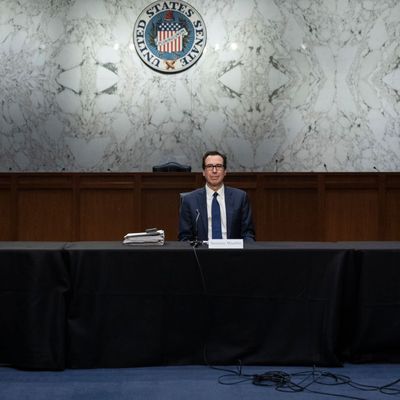
On the day that the head of the Federal Reserve Bank of St. Louis predicted that U.S. unemployment could reach 30 percent in the second quarter, Congress failed to reach an agreement for a coronavirus stimulus package. Democrats blocked Majority Leader Mitch McConnell’s procedural vote to put the $1.6 trillion bill on the Senate floor on Monday morning. Party leaders expressed concerns that the Republican bill would cater heavily toward corporations, and that the $1,200 one-time payment to qualifying adults would not be enough to keep the historic number of unemployed Americans afloat.
Adding to the expected complications of passing one of the largest stimulus bills in U.S. history, on Sunday, Kentucky senator Rand Paul tested positive for the coronavirus. Paul did not socially distance after testing — he was seen in the Senate gym and pool on Sunday morning — and had contact with at least three other Republican senators, leading to an unexpected Democratic majority on the Senate floor:
While Democrats have a surprise advantage in the Senate, Nancy Pelosi is also able to pass a bill in the House without any Republican votes — providing a real opportunity for Democrats to shape the stimulus, which dwarfs the one passed in 2008. With that advantage, Democrats are expected to push for more money for individuals and greater restrictions on the funding going to big business.
“We need a bill that puts workers first, not corporations,” Senate Minority Leader Chuck Schumer said before meeting with Republicans on Sunday morning. House Speaker Nancy Pelosi added, “From my standpoint, we are apart.” According to NBC News, Democrats are rejecting language that allows for corporations to hold onto bailout money while letting go of workers; they are also opposed to the Senate bill’s lack of restraints on the money, and its soft stock-buyback restrictions.
As the bill stands, it would provide $500 billion in loans and loan guarantees to businesses, states, and cities, and another $350 billion for small businesses. The direct payment plan, providing $1,200 for every adult making less than $75,000 and $500 for children, would cost around $250 billion. However, Democrats are also rejecting the phase-in of the universal basic income payment that was reportedly still part of the bill on Friday: Families with no income-tax liability would get a smaller chunk of money (bottoming out at $600), despite being more likely to spend the payment, which is the macroeconomic point of such a measure.
“I couldn’t believe that they were talking about lowest-income people getting $600 and somebody making $75,000 getting twice as much as that,” Michigan senator Debbie Stabenow said. “One-time payments are not what people need. What people need is a paycheck. They need ongoing income until this is done. That’s what they need.” Stabenow added that lawmakers must push for a “robust” expansion of health-care access for the unemployed and argued that the one-time UBI wouldn’t be as effective as a massive expansion of unemployment that would provide Americans with much-needed cash for a longer duration.
This post has been updated.






























